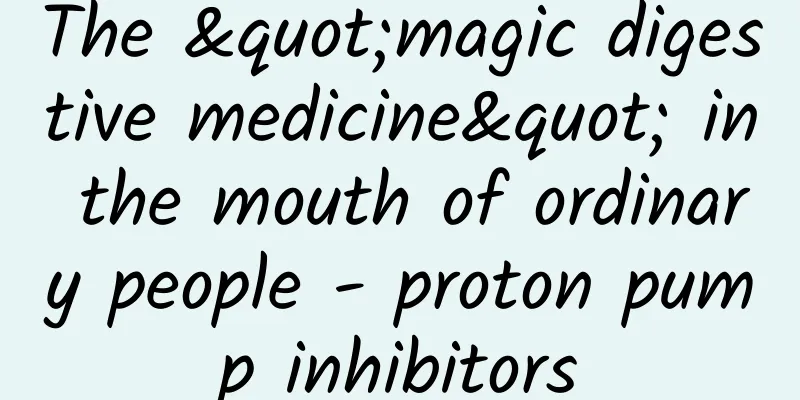The "magic digestive medicine" in the mouth of ordinary people - proton pump inhibitors

|
This is the 5264th article of Da Yi Xiao Hu When it comes to proton pump inhibitors, you may be a little unfamiliar with them. But when it comes to "omeprazole", many people may be very familiar with it. People usually think that stomach pain, bloating, and nausea can be cured by taking some omeprazole. In fact, this is not the case. Omeprazole cannot cure all digestive diseases. Today, I will introduce to you this "magic digestive drug" in people's mouths - proton pump inhibitors. What are proton pump inhibitors? Proton pump inhibitors (PPIs) are a type of prescription drug covered by medical insurance. They have a rapid onset of action, strong and long-lasting acid-suppressing effect, and are safe and well tolerated. They are currently a commonly used drug for the clinical treatment and prevention of acid-related diseases. So how does it work? There is a small factory called "proton pump" on the gastric wall cells, which continuously produces hydrogen ions, that is, protons. The produced hydrogen ions combine with chloride ions in the stomach to form hydrochloric acid, which is what we often call gastric acid. Gastric acid is a very important helper to help us digest food, but if this factory produces too much gastric acid, it may in turn damage the stomach, duodenum and esophagus. Proton pump inhibitors can inhibit the activity of the "proton pump" to reduce the secretion of gastric acid, thereby treating diseases. In addition, proton pump inhibitors can also form a protective film on the gastric mucosa, thereby reducing the irritation of gastric acid to the gastric mucosa. Is it a “magic drug for digestion”? Proton pump inhibitors are not the legendary "magic digestive drugs". Since the main function of proton pump inhibitors is to reduce the secretion of gastric acid, they are mainly used clinically to treat and prevent acid-related diseases. 1. Gastroesophageal reflux disease Gastroesophageal reflux disease refers to a disease in which gastric contents reflux into the esophagus or upper esophagus (larynx), trachea and lungs, causing discomfort and complications. It includes non-erosive gastroesophageal reflux disease, reflux esophagitis, and Barrett's esophagus. The gastric acid in the esophagus will irritate the esophagus, throat, and trachea, causing symptoms such as acid reflux, heartburn, and cough. Proton pump inhibitors are the first choice for the treatment of gastroesophageal reflux disease by inhibiting gastric acid secretion to relieve symptoms such as reflux, heartburn, and upper abdominal burning. 2. Peptic ulcer Peptic ulcer refers to inflammatory defects in the gastrointestinal mucosa, including gastric ulcer and duodenal ulcer, which is usually related to relatively excessive gastric acid secretion. Helicobacter pylori infection is the most common factor causing peptic ulcer. In clinic, all patients with peptic ulcer should receive gastric acid suppression therapy in the absence of absolute contraindications to prevent gastric acid from irritating the mucosa and clearing Helicobacter pylori. Proton pump inhibitors are the preferred drugs. 3. Chronic gastritis Chronic gastritis refers to chronic gastric mucosal inflammation caused by a variety of causes, among which Helicobacter pylori infection is one of the most common causes. Therefore, the acid-suppressing effect of proton pump inhibitors can be used to reduce the irritation of gastric acid on the gastric mucosa, protect the gastric mucosa, and eliminate Helicobacter pylori at the same time. 4. Eradication of Helicobacter pylori Helicobacter pylori is a bacterium that lives in various areas of the stomach and duodenum. It can produce "shields" such as superoxide dismutase and catalase to protect it from being killed by immune cells. It is also rich in urease to decompose urea and produce alkaline substances - ammonia to resist the killing effect of gastric acid. Proton pump inhibitors can inhibit the activity of its urease and take off its "protective cover". It can also inhibit gastric acid secretion and enhance the pH value in the stomach, making antibiotics such as amoxicillin and clarithromycin more stable and active, thereby better exerting antibacterial effects. Therefore, the eradication of Helicobacter pylori generally uses quadruple therapy, that is, a proton pump inhibitor, two antibiotics, and a bismuth agent. Are there any other acid suppressants besides omeprazole? Proton pump inhibitors have undergone significant development since their introduction. Omeprazole, as a first-generation proton pump inhibitor, was first marketed in 1988, opening a new door for acid suppression therapy. Second-generation proton pump inhibitors (such as lansoprazole and paniprazole) have higher bioavailability and more rapid effects than first-generation drugs, and can achieve maximum effects in a faster time after a meal. Third-generation proton pump inhibitors (such as rabeprazole and pantoprazole) are newer generation drugs. Compared with second-generation drugs, they have better drug metabolism characteristics and longer duration of action, higher bioavailability, more stable metabolic process, and longer-lasting acid suppression effect. In general, the main differences between the first, second and third generation proton pump inhibitors lie in the efficacy, metabolic characteristics and acid suppression rate. Although the efficacy and characteristics of proton pump inhibitors have improved with the increase of generations, their specific clinical use still needs to be determined based on the patient's own conditions such as medical condition, economic status, etc. and the doctor's advice. Do you know the course of medication? According to the "Guidelines for the Clinical Application of Proton Pump Inhibitors (2020 Edition)", the common dose of omeprazole is 20 mg, once a day, which can be adjusted to 40 mg, once a day for some patients; the common dose of lansoprazole is 30 mg, once a day; the common dose of pantoprazole is 40 mg, once a day. The general course of treatment for gastroesophageal reflux disease is 4 to 8 weeks, for gastric ulcers is 6 to 8 weeks, and for duodenal ulcers is 4 to 6 weeks. According to the "Guidelines for the Treatment of Helicobacter pylori Infection in China" issued in 2022, the generally recommended treatment for the eradication of Helicobacter pylori is bismuth quadruple therapy, with a course of 14 days. The above are all recommended doses and recommended courses of treatment. When used specifically, they should be adjusted according to the patient's own situation and the doctor's guidance. Do you know how to take it? Proton pump inhibitors are most effective for the acid secretion of parietal cells caused by food stimulation, so if you only need to take the medicine once a day, it is best to take it 30-60 minutes before breakfast. This can inhibit gastric acid secretion before it is stimulated by eating, and better control the amount of gastric acid. Most of the proton pump inhibitors on the market are in the form of enteric-coated tablets and capsules. These dosage forms are designed to allow the drug to pass through the stomach smoothly and reach specific parts of the intestines for release and efficacy. When taking it, the whole tablet (grain) should be swallowed, and at least half a cup of water should be used to take it. If chewed or crushed, the drug may be released in the stomach prematurely. On the one hand, gastric acid may destroy the drug components and affect the efficacy. On the other hand, it may irritate the stomach and cause some discomfort. Author: The First Affiliated Hospital of Xi'an Medical College Yue Yixing Zhang Mingxin |
<<: How to solve the problem of overuse of antibiotics? We want to find an alternative
>>: Original research drugs, that's what it is
Recommend
Is medical abortion painful and how long will it last?
When a woman becomes pregnant unexpectedly, she m...
What are the dangers of uterine cold?
Uterine cold is a common gynecological problem th...
What to do if you have cholecystitis and bloating
Cholecystitis is a common digestive disease that ...
4 months pregnant woman suddenly has severe back pain
Pregnant women are bound to suffer from back pain...
Standard weight and height comparison table for women
In today's society where thinness is consider...
What should I do if I have constipation during confinement?
Confinement is a necessary process for every new ...
[Medical Q&A] What should you pay attention to before and after giving your baby the DPT vaccine?
Author: Wang Lin, Chief Physician, Children's...
How to eat rambutan? How to store rambutan
How many of you have heard of or tasted rambutan?...
Is it good for girls to drink yogurt frequently?
Yogurt is a fermented drink, so it contains a lot...
What should women do if they have accessory breasts?
Women's breasts are a very beautiful part of ...
Is there a high chance of recurrence after removal of one fallopian tube for ectopic pregnancy?
Currently, the best way to treat ectopic pregnanc...
What are the dangers of not having a confinement period?
After ten months of pregnancy, some women choose ...
What are the methods to reduce fever for a one-year-old child who has intermittent fever? How to reduce fever for a one-year-old child who has recurrent fever?
We all know that babies are relatively young, hav...
What causes brown discharge during menstruation?
Sometimes, some women may find brown discharge du...
What factors are related to sore throat after general anesthesia? How to prevent it?
Throat pain after general anesthesia seriously af...









